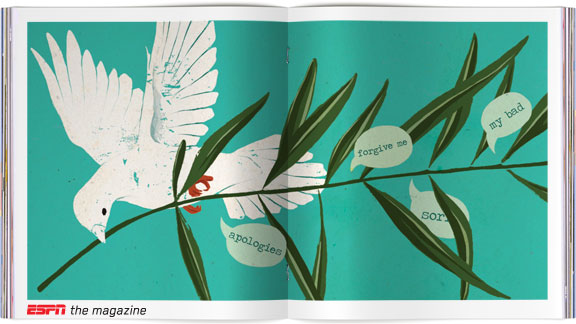Is too much groveling taking the fun out of sports?
MY FAVORITE PROFESSIONAL ATHLETES to cover have included Dennis Eckersley, David Ortiz, Ellis Burks, Jason Giambi, Shawn Springs, Johnny Damon, Orlando Hernandez, David Justice and Gary Sheffield. All were originals, unafraid to speak their mind. At a time when the apology has become the most annoying trend in professional sports, Josh Hamilton must be added to the list.
Two days into spring training, the Rangers outfielder gave a news conference unlike anything we’ve seen of late. Hamilton, a recovering drug and alcohol addict, had recently admitted to drinking in a bar. His contract also happens to expire at season’s end. When asked if the Rangers deserved a hometown discount, he said, “I don’t feel like I owe the Rangers.” And that was that. He spoke his piece. There was no apology, no pap about needing to clarify himself, other than to say later, “My loyalty is here.” He stood by his words, and life went on.
The same day, another player joined my favorites list: Rob Gronkowski, the Patriots tight end. Gronkowski was caught dancing on his bad ankle after his team lost the Super Bowl to the Giants. He was called out by former Pats tough guy Rodney Harrison for having the temerity to leave football on the field and enjoy life when the game was over. Surely, the ubiquitous apology was coming …
Yet when Gronkowski spoke, two weeks after his Feb. 10 ankle surgery, he didn’t say sorry. “I have a lot of fun with my family,” he said. “It was the first time I got to see them in a while. We were just having fun with my brothers and stuff, friends I hadn’t seen in a while.”
Gronk, sadly, is the exception rather than the rule. Whether it’s the fear of backlash — swifter and harsher than ever in the land of Twitter, Facebook, ESPN and the blogosphere — or the fear that the handlers and marketers will freak that some segment of the brand has been compromised, most athletes are scared to say anything interesting or original. And you can bet that the few times they do, they’ll run like hell from it.
Take Brady Quinn, who just apologized to Tim Tebow for essentially telling the world that the sky was blue. In a recent GQ article, Quinn said that a little luck played into Denver’s wild playoff run and that the fans had influenced the organization’s decision to play Tebow. Both statements had the virtue of being completely true, yet there was Quinn after the story came out, suddenly stumbling and groveling to his former teammate, as if he had said Ryan Leaf could have done what Tebow did.
A month earlier, during the Australian Open, Rafael Nadal, who challenges his body as much as he does his opponents with his rugged style, disagreed with Roger Federer about the rigors of the ATP tour schedule. Suddenly, a difference of opinion turned into a “rift” between the two legends — at least that’s how the media spun it. Not needing the heat, Nadal apologized to Federer for publicly airing his view.
If the apologies contain a certain emptiness, the reasoning behind them is even worse. Players seem unwilling to disagree, even respectfully, because they’ve all joined the gilded club of the rich. They see each other less as competitors than as potential attendees at their charity events.
Another factor? Players simply don’t want the grief of having their words extend a news cycle, the drag of responding day after day to contrived controversies. Best just to say sorry and be done with it. This is why they can be only partly blamed for their cowardice. The rest of the blame lands on the fans and media. They say they dislike vanilla athletes, then castigate them for speaking out.
And so it was inevitable that having recently enjoyed two nonapologies in a row, the streak would soon end. The day after Gronk spoke up, Red Sox owner John Henry apologized to Carl Crawford for having said that he was against the outfielder’s seven-year, $142 million deal. Never mind that he had good reasons to be opposed: The Red Sox were plenty lefthanded, and Henry believed the club could have improved in other ways. Crawford said he was hurt, so Henry said he was sorry.
The world is a kinder and gentler place for it. Still, I couldn’t help trying to imagine George Steinbrenner apologizing to Dave Winfield during their feud two decades ago instead of digging up dirt on him.
I’m sorry, it didn’t work.
Source: Howard Bryant
